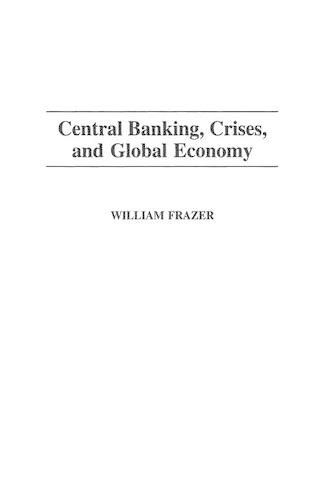
Central Banking, Crises, and Global Economy
(Hardback)
Publishing Details
Central Banking, Crises, and Global Economy
By (Author) William Frazer
Bloomsbury Publishing PLC
Praeger Publishers Inc
30th January 2000
United States
Classifications
Tertiary Education
Non Fiction
Banking
Political economy
International economics
332.11
Physical Properties
Hardback
424
Description
Bridging a gap between economic theory and observed reality, this book examines the most visible central banks, the move to monetary union in Europe, the IMF's new role, the rise of managed market economies, and the elevated importance of central banks. In central banking, attention has often turned to the management of liquidity crises and the attainment of economic stability. In the global economy, the respective market economies are more interconnected, and information regarding crises in one part of the industrialized world is rapidly communicated to other nations, giving the crises themselves a more immediate impact. The Asian debt and liquidity crises of 1997-98 were seen as having an impact on the United States, the European Union countries, and even China. In the effort to attain international stability, the information emanating from central banks at a policy level is crucial. This book aims to depict an ideal central bank for a globally connected country. Two developments heighten the need for such an operations/policy-based ideal: the lessons learned from the European moves to monetary union and the establishment of the European Central Bank, and the increased awareness of banking problems in Asia during the 1997-98 debt and liquidity crises. This timely work will be of interest to economists, bank officials, government policy makers and political scientists.
Reviews
Throughout this exhaustived work, written from an insider's perspective, the author presents a robust account of global economic developments with special reference to how markets actually operate and how the policy decicions that shape them are made.-Review of Radical Political Economics
"Throughout this exhaustived work, written from an insider's perspective, the author presents a robust account of global economic developments with special reference to how markets actually operate and how the policy decicions that shape them are made."-Review of Radical Political Economics
Author Bio
WILLIAM FRAZER is Professor of Economics at the University of Florida. He has held faculty fellowships at Harvard and the University of Pennsylvania and had research assignments at Federal Reserve banks in New York and Chicago. He has written widely, including The Friedman Systems: Economic Analysis of Time Series (Praeger, 1997), The Florida Land Boom: Speculation, Money, and the Banks (Quorum, 1995), The Central Banks: The International and European Directions (Praeger, 1994), and The Legacy of Keynes and Friedman: Economic Analysis, Money, and Ideology (Praeger, 1994).
